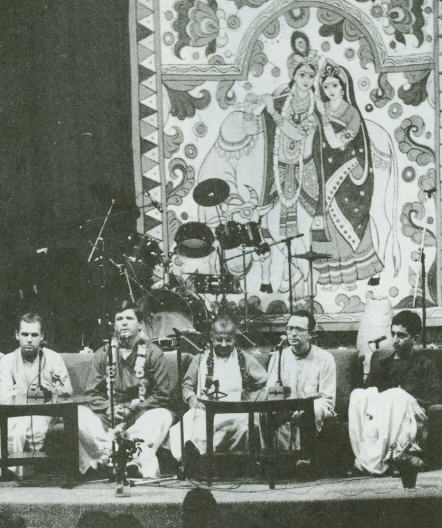This article appeared in the December 1990 issue of Soviet Union Illustrated Monthly magazine. The magazine, founded under the title USSR in Construction in 1930 by Maxim Gorky, is published in twenty-one languages.

Kirtiraja Dasa Speak About the Hare Krsna Movement
The restructuring drive and new thinking in the Soviet Union have brought about a fundamental change in state-church relations in this country. Hundreds of Russian Orthodox temples have been recently restored and opened to believers, ancient mosques are being built and restored now, various religious communities have been registered, and Sunday schools are opening. All this was reaffirmed by the Law on the Freedom of Conscience and Religious Organizations passed by the USSR Supreme Soviet, which "guarantees the citizens' right to determine and express their religious beliefs, to unrestrictedly profess and execute religious rites."
Twenty years have passed since the visit to the Soviet Union of Srila Prabhupada, the spiritual father of Krishna's followers. That visit planted the seeds of Vishnuism, a new and unorthodox phenomenon in this country. Today there are nearly 10,000 Vishnuites in 100 cities of the country. These are people of different ages and social backgrounds. Most of them are well-educated people like engineers, physicians, laboratory workers, and journalists, but there are also workers and students among them as well.
After Prabhupada's demise in 1977, his followers divided the world into several zones. The zone the Soviet Union is part of is supervised by Robert Campagnola (the spiritual name: Harikesha Swami) and David Jakupko (Kirtiraja Dasa). [Three more supervisors have since been added.]
In the summer of 1990 these spiritual leaders of the International Society for Krishna Consciousness paid a visit to the Soviet Union. During a press conference in Moscow they briefed the audience on the Society's activity, and spoke about its international ties and the proliferation of Krishna's teachings in the world and in the Soviet Union.
Only a few years ago, the adherents of Krishna were persecuted by the Soviet authorities and were looked upon as subversive elements. Ten years ago Harikesha and Kirtiraja were even deported from the USSR and the Society was banned. Today the Krishna Society is officially recognized in this country.
Harikesha and Kirtiraja expressed their gratitude to the Soviet authorities for allowing them to visit their fellow believers. The goal of the visit was to establish spiritual and other contacts. Plans are afoot, for example, to render material aid to the Soviet Krishna worshippers and help to build a temple.
Although the Krishna movement originated in India, its center has now moved to the West (by the way, both leaders are Americans), is rich and has a powerful publishing potential.
One can often see Krishna followers selling their literature near underground stations, in underground crossings, and in the streets of Moscow and other cities.
That's probably why Muscovites showed such a great interest in the big programme presented by the Krishna Society that included sacred music, classical Indian dances, an exhibition and sale of books and a presentation of video film held in one of the exhibition halls of the Moscow International Trade Center.
The Vishnuites believe that if a teaching leads to a better understanding of life and makes people better and stronger, it has the right to exist and win the hearts of people.
